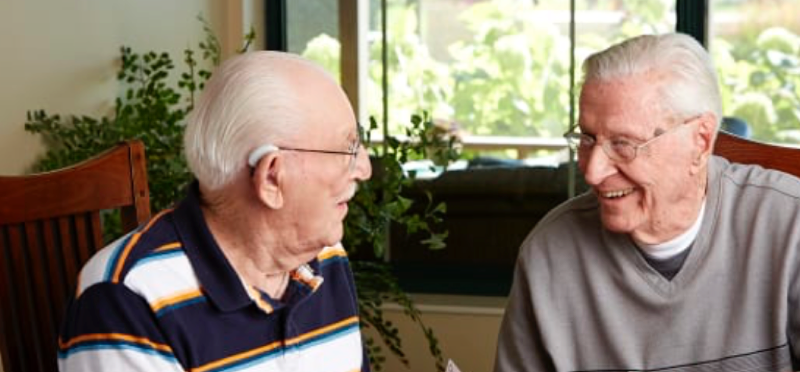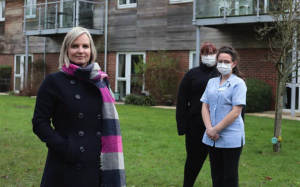
Building rapport with a person living with dementia
Sarah Reed
June 2023
Without doubt, good interpersonal relationships are essential to everyone’s happiness. We all know people who are able to connect well with others, creating a sense of harmony, affinity and trust in minutes. It might seem like natural ability, but when understood, it can also be nurtured and improved. This is rapport.
Rapport helps us make meaningful and harmonious relationships with people. It’s that sense of connection that you get when you meet someone you like and trust, whose point of view you understand, with a bond that comes from sharing some of each other’s values and priorities in life. This mutual understanding and acceptancebetween someone caring for a person with dementia and the person themselves is a crucial part of well-being.
Rapport with someone means being both focused on and interested in what they are thinking and saying; being friendly, positive, showing care and concern for the other person, feeling ‘in sync’, with some shared common understanding.
Rapport can deliver helpful results, like greater awareness and similar, shared energy levels and more nuanced body language. It can appear instantly, as when you find yourself just ‘clicking’ with someone – or it may build slowly, over time. It can grow naturally, without intent, or it can be quite deliberate and grow through meaningful conversation. And as for the best conversations, it’s surprisingly simple really – nearly all of us enjoy talking about ourselves.
As brain scans show, one reason why we enjoy talking about ourselves so much, is that when we do, the mid-brain regions that deliver dopamine, – the ‘feelgood’ chemical associated with pleasure and reward, light up brightly. In one study, research subjects were even willing to forgo money to disclose their stories, with the rewards of sharing them being enough just in themselves. Honestly, you couldn’t make it up!
Here are some tips for engaging in conversation with a person living with dementia that can create greater rapport. And like all good dementia skills, they still apply to conversations you might have with anyone…
Feeling safe and positive matters.
A person with dementia needs to be able to trust you and know that you are on their side. Don’t patronise them – the person has a life time full of rich experiences. Always accept that their reality is real to them and avoid logic and reasoning, which can prompt arguments.
Sincerity matters.
A lot. Sincerity and rapport are interlinked. A person with dementia can still discern when it’s missing, so it’s important to be authentic and genuine.
Self-awareness matters.
Be observant of the person and of yourself. Having insight into why you feel the things you feel, why you behave in particular ways and how others might see you, is all part of building rapport.
Listening matters.
However difficult to do, it really does! Perhaps more than any other skill, listening actively is the key to rapport, – and therefore all our relationships. Resist the urge to switch off!
Empathy matters.
Empathy is the ability to sense another person’s emotions and to envisage what they might be feeling, showing compassion and understanding (not to be confused with sympathy).
Body language matters.
It’s good to remember that it is a major part of your communication. Ensure that yours is open and similar to the person you are with. Remember, your face will convey that you are listening – if you turn towards them, with your eyes focused on them, at the same level whenever possible.
Smiling matters.
Smiling decreases cortisol in the body, helps heart health, lowers blood pressure and reduces stress. A simple smile, whether given or received, prompts the brain to produce endorphins and serotonin, the ‘happy hormones’ that trigger positive emotions. There’s nothing like some merriment – sharing things you have in common that are humorous and amusing are a great fast-track for building rapport.
“Tell me about...”
is a wonderful starting point for a conversation to develop rapport. As both a suggestion and an enquiry, “tell me about…” implies curiosity to explore more about the person and their life – and promises attentiveness to their answer.
The more you show genuine interest in and appreciation of any person, the more likely they are to relax and open up. If you can tempt them to talk about themselves, you’re making progress. If you can show them that you’re really listening to them, rapport will surely follow.
merriment – sharing things you have in common that are humorous and amusing are a great fast-track for building rapport.




No comment yet, add your voice below!